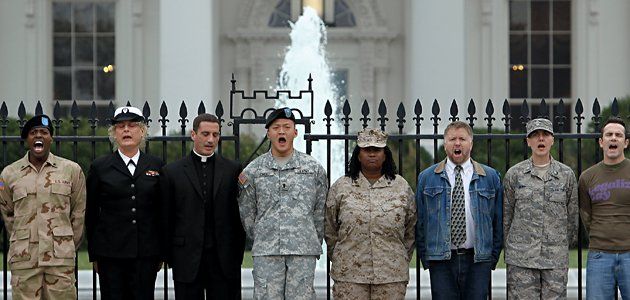
Congress now faces unprecedented pressure to repeal "don't ask, don't tell." The Pentagon released its report on the issue last week, finding that 70 percent of troops thought repeal would have mixed, positive, or no effect on the military. Defense Secretary Robert Gates urged the Senate to act quickly, as did Joint Chiefs of Staff chairman Adm. Mike Mullen. But critics worry that the policy change could affect unit cohesion and be a distraction at a time of war. So it's worth asking: what would repeal really entail? A quick guide:
Chaplains would minister to gay and lesbian troops.
Many chaplains vehemently oppose repeal and, in the report's words, "believe that homosexuality is a sin and an abomination, and that they are required by God to condemn it." But chaplains are also required to serve all troops. "They can still follow their consciences," says Aaron Belkin of the Palm Center, a UC Santa Barbara public-policy think tank. "They would counsel gays the same way a rabbi would counsel a Catholic."

Gay partners wouldn't have the same rights as spouses.
The federal Defense of Marriage Act would deny gay military families such benefits as lower-cost housing. Why? The report says opening military housing to spouses who aren't legally recognized "would create occasions for abuse and unfairness." Benefits that would possibly extend to partners: free legal services, hospital visitations, missing-member notifications.
Gay sex would not be considered a crime.
The Uniform Code of Military Justice would be altered to remove "private consensual sodomy between adults" as a criminal offense. As is now the case for heterosexual troops, the military would discourage public displays of affection but not regulate them. "This is actually one area that will involve a change in military culture," says Bridget Wilson, a San Diego lawyer who specializes in military cases. "There will be ships coming back from cruises and soldiers coming home from deployments. When they are met by their families, there will be hugging and kissing."
No "protected class" advantages and no quotas for gays.
Antigay discrimination or harassment would be dealt with through existing channels for complaints not related to race, sex, religion, or other differences.
Bathrooms and sleeping quarters would be shared.
The Pentagon report says segregation of such facilities would be "a logistical nightmare" and would "stigmatize gay and lesbian Service members in a manner reminiscent of 'separate but equal' for blacks prior to the 1960s."
Gays and lesbians could travel to countries where homosexuality is illegal, with no restrictions on overseas assignments.
They would be briefed on legal risks before deployment, however. Partners traveling overseas would not get legal protections often afforded to opposite-sex spouses. "Our primary objective is repeal," says Aubrey Sarvis, executive director of the gay-advocacy group Servicemembers Legal Defense Network. "It's not politically expedient to insist on getting this perfect from day one."
Uncommon Knowledge
Newsweek is committed to challenging conventional wisdom and finding connections in the search for common ground.
Newsweek is committed to challenging conventional wisdom and finding connections in the search for common ground.





